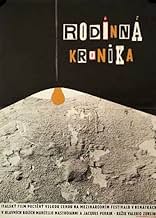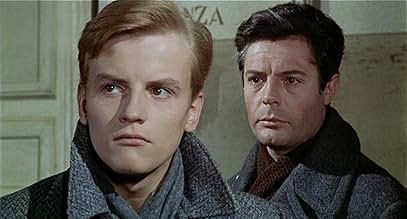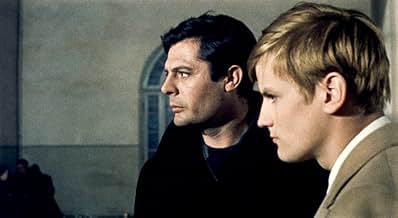NOTE IMDb
7,1/10
1,3 k
MA NOTE
Rome, 1945. Enrico Corsi, journaliste se souvient de la vie de son jeune frère décédé.Rome, 1945. Enrico Corsi, journaliste se souvient de la vie de son jeune frère décédé.Rome, 1945. Enrico Corsi, journaliste se souvient de la vie de son jeune frère décédé.
- Réalisation
- Scénario
- Casting principal
- Récompenses
- 5 victoires et 3 nominations au total
Angelo Casadei
- Un visitatore all'ospedale
- (non crédité)
Avis à la une
10Aw-komon
Phew! What a beautiful film! I'd rank this as one of the most awe-inspiringly composed and photographed color films of all time. You've never seen Mastroianni, until you've seen him in this film, walking around like an iconic black ghost in the darkly hued existentialist-to-the-nth-degree technicolor universe of post-war Italy created by Zurlini and legendary DP Giussepe Rottuno. What a stroke of genius to contrast the bleakest and most depressing of subjects possible with the most fantastically poetic and gorgeous technicolor cinematography this side of `Black Narcissus.' This is one of Rottuno's finest works ever: full of absolutely breathtaking deeper than deep blacks and colors that seem to have sprouted from some otherworldly weathered, neo-realist hallucination. And what timeless subtly paced, unerringly poetic, intelligent and completely uncompromising direction by Zurlini, the forgotten genius of Italian cinema, whose style in this film can be roughly described as a unique melange of neo-realism, Antonioni, Michael Powell, Jacques Becker, early Pasolini and early Bertolucci. It's easy to imagine how easily this story of a tubercular writer grieving the death of his younger brother through a series of flashbacks could've turned into not much more than a melodramatic tearjerker; yet in Zurlini's hands and through the incredible, tour-de-force performance of Marcello Mastroiani in the lead role, the Marxist-proleteriat-plight-of-the-poor sentimentality at the film's core transcends itself and becomes a deeply affecting, painful and ultimately cathartic meditation on death, despair, and the possibilities of redemption in the direst of circumstances.
In 1945, Enrico Corsi (Marcello Mastroianni) receives news of his younger brother Lorenzo's death. He recalls their earlier lives. Their mother had died from complications giving birth to Lorenzo. With their father sick, Lorenzo was raised by an English baron's butler as a gentleman while Enrico was raised by their poor grandmother. Next, they run into each other in 1935. They have been estranged from each other and from their sick father. History is recounted as they come to terms with their brotherhood. Enrico has the drive from his poverty. Lorenzo has no ambition and struggles to find a steady job. His pretty face is not enough. He joins medical trials and falls ill.
Whether it's Enrico's narration or the dialogue, everything is in a hush tone. It is a sad grinding descend. It's a little distancing especially when we're told about his bad marriage but never meet his wife. There are a lot of talking but it feels melodramatic. Mastroianni remains a master. I don't think I can stay with this movie without him.
Whether it's Enrico's narration or the dialogue, everything is in a hush tone. It is a sad grinding descend. It's a little distancing especially when we're told about his bad marriage but never meet his wife. There are a lot of talking but it feels melodramatic. Mastroianni remains a master. I don't think I can stay with this movie without him.
Two brothers ;one of them,after his mother's death (she died during the birth)is taken in by a rich man,the other has to manage .But things will not turn out as expected.
The movie is a long flashback ,Enrico's somber meditation on his young brother's fate ,whom he only saw sporadically.There are a lot of holes in the plot,probably the weakest link of an unusual film.Mastroianni and Perrin (hardly 21) give strong performances which allow the movie to avoid pathos and melodrama.They are given strong support by madame Sylvie,as their grand-mother.What will strike you in Zurlini's film is the total absence of happiness,in the world which has forgot what it is to be happy:even the scene at the restaurant where the two boys invite their grandma is downright depressing;later the money the old lady gives to her grandson leaves a bitter taste in the mouth.All the scenes in the hospital are harsh,and may repel some.
It was the second time Zurlini and Perrin had teamed up,after "la ragazza con la valiglia".The last time ,in 1976,was the making of their masterpiece (Zurlini:director;Perrin:producer and actor) " Il deserto dei Tartari" from Buzatti's eponymous novel.
"Cronica familiare" is a movie that deserves to be watched,unless you're down in the dumps.
The movie is a long flashback ,Enrico's somber meditation on his young brother's fate ,whom he only saw sporadically.There are a lot of holes in the plot,probably the weakest link of an unusual film.Mastroianni and Perrin (hardly 21) give strong performances which allow the movie to avoid pathos and melodrama.They are given strong support by madame Sylvie,as their grand-mother.What will strike you in Zurlini's film is the total absence of happiness,in the world which has forgot what it is to be happy:even the scene at the restaurant where the two boys invite their grandma is downright depressing;later the money the old lady gives to her grandson leaves a bitter taste in the mouth.All the scenes in the hospital are harsh,and may repel some.
It was the second time Zurlini and Perrin had teamed up,after "la ragazza con la valiglia".The last time ,in 1976,was the making of their masterpiece (Zurlini:director;Perrin:producer and actor) " Il deserto dei Tartari" from Buzatti's eponymous novel.
"Cronica familiare" is a movie that deserves to be watched,unless you're down in the dumps.
I watched this on TCM and there was something wrong. when Enrico thinks about his brother in voice over, (as if he is writing an autobiography,) instead of Marcello's voice, some idiot dubbed in a ridiculous American actor's voice. firstly, the dubbed voice is all wrong in tone...it's as if the actor were from Car54 or Dragnet, and secondly, the voice reads the lines in the third person, often with bad translation!!!
So you have Enrico remembering his brother, and relating his recollections to the audience in the first person, but you have a voice over going "Enrico says", and "Enrico thinks",...it's a travesty.
This film is somewhat too sentimental, and slightly overwrought, but it has touching and truthful scenes as well. too bad that just when you become involved, some American butchery intrudes. 6/10.
So you have Enrico remembering his brother, and relating his recollections to the audience in the first person, but you have a voice over going "Enrico says", and "Enrico thinks",...it's a travesty.
This film is somewhat too sentimental, and slightly overwrought, but it has touching and truthful scenes as well. too bad that just when you become involved, some American butchery intrudes. 6/10.
Never heard of this film until 3/20 at 2 am..Thanks to TCM.. & Ive been a fan of Mastroianni & Italian cinema for decades... this is a real beauty..another hidden treasure.. really wanted to sleep (Im an insomniac) but couldnt It was magnificent..Mastroianni was one of the grreatest actors ever on Cinema.. & this film is special..same year as Divorce Italian Style & a year prior to 8 1/2...this film was hidden dont recall it being released in US theatres & was going to see his movies at that time..Mastroianni is magnificent, & as his younger brother, Jacques Perrin is outstanding as is the entire..(unknown to me ,cast) can't wait to see again..Must mention the photography.. filmed like beautiful Italian paintings subtle earth tones, realistic, soft yet striking..each frame is a work of art..Bravo..can't wait to see again & again
Le saviez-vous
- AnecdotesJacques Perrin had already played a boy named Lorenzo in the previous movie by Valerio Zurlini, "Girl with a Suitcase"
- GaffesIn the later sequence in the hospital, there are hairs on the film in several scenes.
- ConnexionsReferenced in Close-Up: Why do We Need the Venice Film Festival? (2024)
Meilleurs choix
Connectez-vous pour évaluer et suivre la liste de favoris afin de recevoir des recommandations personnalisées
Détails
- Durée
- 1h 53min(113 min)
- Mixage
- Rapport de forme
- 1.85 : 1
Contribuer à cette page
Suggérer une modification ou ajouter du contenu manquant
























